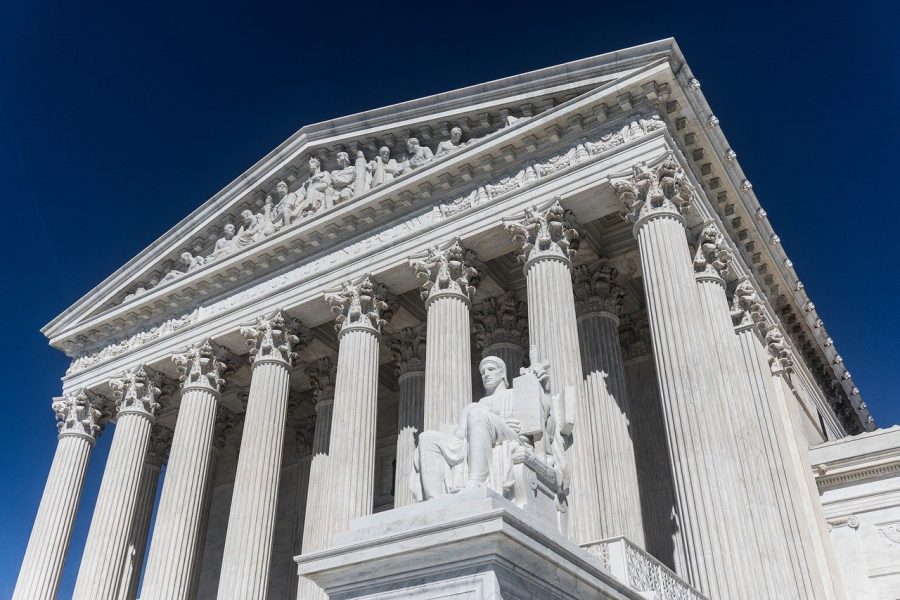Texas’ abortion bill is an attack on free choice
Texas’ abortion bill may soon find its way to the floor of the U.S. Supreme Court
September 24, 2021
A new state law restricting abortion access went into effect in Texas. Known as SB (Senate Bill) 8, the new law effectively bans all abortions past six weeks of pregnancy when a fetal heartbeat is detected; in addition, the law makes no distinction between pregnancies caused by rape or incest. The law stands in violation to Supreme Court precedent which prohibits states from banning abortions before fetal viability, about 22 to 24 weeks into the pregnancy. This law also represents a shameless attack on Roe v. Wade, a woman’s right to choose, and sets a precedent that citizens may be deputized to enforce a constitutionally questionable law; the state can shirk a legal challenge to the law by saying they are not responsible for enforcing it. The law is unique in the fact that government officials are prohibited from enforcing the six-week limit on abortions; instead, the law encourages citizens to sue clinics, doctors, and others who assisted in helping someone get abortions. Under SB8, the patient themselves may not be sued, but plaintiffs who sue those who assisted in an illegal abortion and win can collect up to $10,000 and receive compensation for any legal costs incurred. Victorious defendants are not entitled to having their legal costs covered.
The Supreme Court refused to take any action against the Texas law in a 5-4 vote with the court’s three liberal members in dissent alongside Chief Justice John Roberts Jr. In an unsigned majority opinion, the court stated that because the “…state has represented that neither it nor its executive employees possess the authority to enforce the Texas law…” The majority opinion clarified that while it was rejecting the initial challenge to SB8, it was not a “conclusion about the constitutionality of Texas’s law.” The law was drafted with the intention of making it difficult to challenge in federal court, as state officials who would usually be named when challenging such a law have no power to enforce SB8 and therefore cannot be named as defendants per the court’s decision.
The deputization of citizens to enforce this law is an attack on women that puts $10,000 bounties on their heads for receiving care that should be their choice alone. This law encourages neighbors to inform on and turn one another in, destroying any sense of community and instead fostering a culture of suspicion and hostility. If this law is allowed to stand, then what might future laws targeting sensitive issues look like? For example, maybe a law is passed banning a certain type of firearm, but only citizens may enforce it. The law might ignore precedents set by previous court decisions and the Second Amendment, but according to the Supreme Court’s decision, if state officials have no authority to act on the law then they may not be named as defendants in any challenge to it. SB8 should be called out for what it is, an attack on the democratic process to challenge unjust laws through a system of courts.
A woman should not have decisions on her pregnancy made by any level of government. Bringing a human life into the world is a life-altering decision that should in no way be forced onto a woman. The lack of distinction between a normal pregnancy and pregnancies caused by rape or incest is another disturbing element of this law; women who have suffered sexual trauma will now be expected to carry their children to term if they fail to notice their pregnancy before the six-week mark. Protecting a woman’s right to choose is fundamental to preserving gender equality in the United States.
While the Supreme Court may not be hearing a challenge on SB8, the court will hear a challenge to Mississippi’s abortion law banning abortions after fifteen weeks. Another law that ignores the precedent of fetal viability, the court will be deciding whether bans on pre-viability abortions are constitutional when it convenes for its next term in October. This case could uphold the right to abortion as guaranteed by Roe v. Wade or dismantle it, opening the floodgates for more bills like those in Texas and Mississippi.



